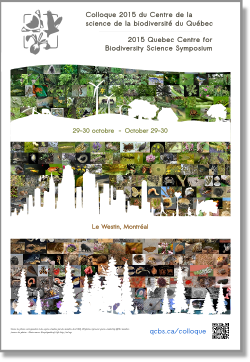General Information
 This year the QCBS held its annual symposium (Oct 29-30th) at the Westin Hotel in conjunction with the 19th Subsidiary Body on Scientific, Technical and Technological Advice (SBSTTA) meeting of the Secretariat of the Convention on Biological Diversity (in Montreal Nov. 2-7 2015). A joint workshop, co-organized by the QCBS, the SCBD and the Future Earth (international program on sustainable development, www.futureearth.org) was planned for Octobter 31st at the ICAO. The goal was to foster the translation of biodiversity science into advice for practitioners and policy makers from around the world.
This year the QCBS held its annual symposium (Oct 29-30th) at the Westin Hotel in conjunction with the 19th Subsidiary Body on Scientific, Technical and Technological Advice (SBSTTA) meeting of the Secretariat of the Convention on Biological Diversity (in Montreal Nov. 2-7 2015). A joint workshop, co-organized by the QCBS, the SCBD and the Future Earth (international program on sustainable development, www.futureearth.org) was planned for Octobter 31st at the ICAO. The goal was to foster the translation of biodiversity science into advice for practitioners and policy makers from around the world.
The winners of the QCBS symposium prizes
The QCBS would like to congratulate the following QCBS students for receiving the 2015 Symposium prizes:
- QCBS prize: Kiyoko Gotanda (McGill) – ” You are what you eat: the role of humans in the evolution of Darwin’s finches”
- 1st place for best presentation: Xavier Giroux-Bougard (McGill) – ” The central-marginal hypothesis revisited: landscape structures mediate gene flow.”
- 2nd place for best presentation: Kevin Cazelles (UQÀR) – ” Les interactions affectent-elles la répartition spatiale des espèces ?”
- 1st place for best poster: France Beauregard (UdeM) – ” Triploïdes persistants ou éphémères? Deux modus operandi épigénétiques”
- 2nd place for best poster: Dylan Yaffy (McGill) – ” Time to move: Environmental drivers of wood bison movement at multiple scales”– and Bertrand Charry (McGill) – ” Narwhal’s newborn indexes in two different areas in Nunavut: Eclipse sound and Admiralty Inlet.”
The winners of the photo contest
According to a public vote, the winning pictures were:
- Nature: Kiyoko Gotanda
- Scientists at work: Emmanuelle Chrétien
- Social life: Catalina Gomez
Congratulations!!
October 29th, 2015 : Day 1 of the QCBS conference consisted of three parallel sessions of talks by QCBS researchers on all dimensions of biodiversity science.
At the end of the day
Nature as profit center: The new conservation science and the devaluing of biodiversity by Dr Daniel Simberloff
2015 Joan Marsden Lecture in Organismal Biology (McGill University)
Date & Time: Thursday October 29 at 5PM
Location: Redpath Museum Auditorium
 October 30th, 2015 : Day 2 comprised of two panels on nexus issues linking biodiversity to cities, agrosilvopastoral systems, and health as well as two parallel sessions of talks. The panels will involve talks by experts on the topic and then a Q&A with the audience. This was followed by speed talks, a poster session and cocktail.
October 30th, 2015 : Day 2 comprised of two panels on nexus issues linking biodiversity to cities, agrosilvopastoral systems, and health as well as two parallel sessions of talks. The panels will involve talks by experts on the topic and then a Q&A with the audience. This was followed by speed talks, a poster session and cocktail.
Plenary speaker
Dr Mulrennan’s research interests focus on indigenous peoples and their use and management of coastal and marine environments. More specifically she is interested in local ecological knowledge, community-based management, protected area development, human adaptations to environmental change, and small boat fisheries development. She has worked closely with Torres Strait Islanders (northern Queensland) since the early 1990s, initially as Coordinator of their Marine Strategy for Torres Strait (MaSTS) and more recently, in collaboration with Colin Scott (Anthropology, McGill University) in the documentation of local knowledge, marine resource use and Islander sea claims. She is a member of the McGill Wemindji Protected Area Project which is a research partnership with the James Bay Cree community of Wemindji (northern Quebec) focused on the establishment of culturally-appropriate protected areas on significant portions of their traditional territory.
Panels – Biodiversity and Human Well Being
Panel 1 – Nexus between health and biodiversity
- Andrew Gonzalez, McGill University. Linking biodiversity change to human health and wellbeing: an overview of current knowledge
- Virginie Millien, McGill University. The role of the white-footed mouse in the spread of Lyme disease, and the implication of climate change.
Panel 2 – Nexus between cities and biodiversity
- Jochen A.G. Jaeger, Concordia University. Operational guidance through indicators of normative relevance: Landscape fragmentation, road ecology, and the City Biodiversity Index (CBI) as case studies.
- Jérôme Dupras, Université du Québec en Outaouais. Planning for Montreal green infrastructures: analyzing conservation priorities.
- Alain Cogliastro, Institut de recherche en biologie végétale. Enrichment in urban forests: planting our future.
Panel 3 – The links between biodiversity, resilience and productivity in agrosilvopastoral systems.
- Elena Bennett, McGill University. Ecosystem services and multifunctionality: what role do they play in the resilience of agricultural systems
- Emma Despland, Concordia University. Insects in changing landscapes: why do some become pests and others go extinct? AbstractAgrosilvopastoral landscapes are highly modified by human activity – often to the detriment of biodiversity, but to the great advantage of a few species, known as pests. Whether herbivorous insects become more or less abundant in human-modified landscapes depends on the diversity of their interactions with host plants. A simple conceptual model shows how anthropogenic drivers that alter constraints acting on insect populations can lead to the surpassing of critical thresholds, hysteresis, and a change in the insect’s role in the ecosystem. In extreme cases, the system’s resilience is exceeded, generating fundamental regime shifts in which the system’s functioning can no longer be predicted based its past behaviour.
- Tanya Handa, UQAM. Diversity and decomposition: a search for mechanisms across ecosystems
- Joseph Moisan-De Serres. Ministère de l’agriculture, des pêcheries et de l’alimentation. Influence of pollinators on the productivity of agro-ecosystems: a matter of proximity and species mixing.
Joint Workshop
A joint QCBS-SCBD-Future Earth workshop (31st Oct) will focus on the nexus between human well-being and biodiversity. The conclusions of the 3 panels organized on day 2 of the QCBS Symposium will be presented to all participants. World Cafe style discussions in the afternoon will stimulate ideas to enhance interactions and collaboration between the CBD, Future Earth and the QCBS.
See the preliminary program for the workshop here.
Refund Policy
Cancellations received up to and including October 15, 2015 will receive full refund of their registration fees.
Refunds will be provided by applying a refund to the credit card used in registering.
All cancellations notices and refund requests must be received by e-mail (info@qcbs.ca).
No refunds will be made for cancellations received after October 16, 2015.



